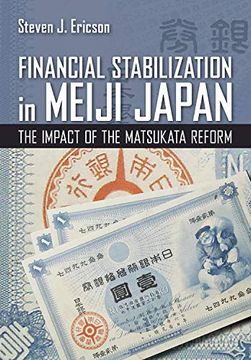Share
Financial Stabilization in Meiji Japan: The Impact of the Matsukata Reform (Cornell Studies in Money)
Steven J. Ericson (Author)
·
Cornell University Press
· Hardcover
Financial Stabilization in Meiji Japan: The Impact of the Matsukata Reform (Cornell Studies in Money) - Steven J. Ericson
Choose the list to add your product or create one New List
✓ Product added successfully to the Wishlist.
Go to My Wishlists
Origin: U.S.A.
(Import costs included in the price)
It will be shipped from our warehouse between
Monday, May 27 and
Wednesday, June 12.
You will receive it anywhere in United Kingdom between 1 and 3 business days after shipment.
Synopsis "Financial Stabilization in Meiji Japan: The Impact of the Matsukata Reform (Cornell Studies in Money)"
With a new look at the 1880s financial reforms in Japan, Steven J. Ericson's Financial Stabilization in Meiji Japan overturns widely held views of the program carried out by Finance Minister Matsukata Masayoshi. As Ericson shows, rather than constituting an orthodox financial-stabilization program-a sort of precursor of the "neoliberal" reforms promoted by the IMF in the 1980s and 1990s-Matsukata's policies differed in significant ways from both classical economic liberalism and neoliberal orthodoxy. The Matsukata financial reform has become famous largely for the wrong reasons, and Ericson sets the record straight. He shows that Matsukata intended to pursue fiscal retrenchment and budget-balancing when he became finance minister in late 1881. Various exigencies, including foreign military crises and a worsening domestic depression, compelled him instead to increase spending by running deficits and floating public bonds. Though he drastically reduced the money supply, he combined the positive and contractionary policies of his immediate predecessors to pull off a program of "expansionary austerity" paralleling state responses to financial crisis elsewhere in the world both then and now. Through a new and much-needed recalibration of this pivotal financial reform, Financial Stabilization in Meiji Japan demonstrates that, in several ways, ranging from state-led export promotion to the creation of a government-controlled central bank, Matsukata advanced policies that were more in line with a nationalist, developmentalist approach than with a liberal economic one. Ericson shows that Matsukata Masayoshi was far from a rigid adherent of classical economic liberalism.
- 0% (0)
- 0% (0)
- 0% (0)
- 0% (0)
- 0% (0)
All books in our catalog are Original.
The book is written in English.
The binding of this edition is Hardcover.
✓ Producto agregado correctamente al carro, Ir a Pagar.

